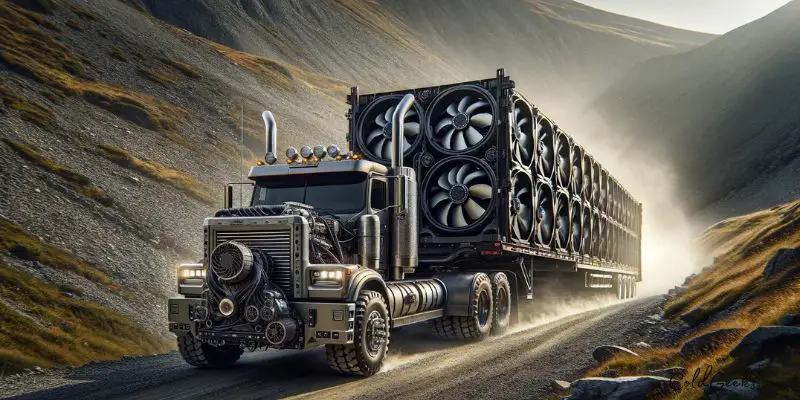As someone deeply involved in the automotive and electric fan industry, I’ve often encountered the question of whether electric fans are good for towing.
Towing demands a lot from a vehicle, including the need for efficient cooling to manage the added strain on the engine.
Here is a summary of the answer to the question, “Are electric fans good for towing?”
Electric fans are beneficial for towing due to improved fuel efficiency, enhanced cooling at low speeds, and increased power output. They operate on-demand, reducing engine load and optimizing cooling based on temperature needs.
This article combines technical insights with real-world applications to help you make an informed decision for your towing needs.
The Role of Cooling Systems in Towing

When it comes to towing, the cooling system of a vehicle plays a pivotal role.
The added weight and resistance when pulling a trailer or caravan puts extra demand on the engine, leading to increased heat generation.
Traditional mechanical fans, which are driven by the engine, have been the standard for cooling systems.
However, the rise of electric cooling fans has sparked a debate on their efficiency.
Especially in towing scenarios.
Electric Fans Explained
Electric fans are powered by the vehicle’s electrical system and can be controlled to turn on and off as needed, providing cooling on demand.
This is in contrast to mechanical fans that run continuously with the engine.
The primary advantage of electric fans is their ability to maintain optimal engine temperature, regardless of engine RPMs.
This feature is particularly beneficial in towing, where maintaining a consistent engine temperature is critical to performance and longevity.
Advantages of Electric Fans for Towing
- Improved Fuel Efficiency: Electric fans can improve fuel efficiency by reducing the parasitic drag on the engine. Since they only operate when necessary, they don’t continuously draw power from the engine, unlike mechanical fans. This reduction in engine load can lead to better fuel economy, which is a significant advantage when towing over long distances.
- Enhanced Cooling Capability: Electric fans can provide more effective cooling because they can be designed to move a larger volume of air through the radiator at times when it’s most needed. For towing applications, this means the engine can be kept at an optimal operating temperature, even under heavy loads and at low speeds where airflow is limited.
- Increased Power Output: By eliminating the mechanical fan, you free up engine power that was previously used to drive the fan. This can result in a slight increase in available power for towing, which can be especially noticeable in vehicles with smaller engines.
Considerations and Drawbacks
While electric fans offer several benefits for towing, there are also considerations to be mindful of:
- Electrical System Demand: Electric fans require a robust electrical system to operate effectively. Vehicles with older or marginal electrical systems may need upgrades to accommodate the additional load, especially if other power-intensive accessories are used during towing.
- Installation Complexity: Converting from a mechanical to an electric fan can involve a significant amount of work, including wiring, mounting, and possibly modifying the radiator shroud. This complexity might be a deterrent for those not comfortable with extensive DIY projects.
- Cost: Initial setup costs for electric fans can be higher than maintaining a mechanical fan system. However, the long-term benefits, such as improved fuel efficiency and potentially lower maintenance costs, can offset the initial investment over time.
Comparison of Electric Fans vs. Mechanical Fans
| Feature | Electric Fans | Mechanical Fans |
|---|---|---|
| Operation | On-demand, controlled by vehicle’s electrical system | Continuous, driven by the engine |
| Efficiency | High, as they operate only when needed, reducing engine load | Lower, due to constant operation regardless of cooling needs |
| Power Consumption | Draws power from the electrical system | Consumes engine power, affecting fuel efficiency |
| Cooling Effectiveness | Can be optimized for high performance, especially at low speeds or when idling | Effective at higher speeds, but less so at low speeds or in traffic |
| Installation Complexity | May require significant modifications and electrical work | Typically simpler, as they are part of the original engine design |
| Cost | Potentially higher initial cost, but can lead to savings on fuel and improved performance | Lower upfront cost, but less efficient in fuel consumption and performance |
Electric fans offer distinct advantages in efficiency and cooling effectiveness, particularly for vehicles used in towing.
Their ability to operate on-demand means they can provide cooling exactly when it’s needed, without placing a constant load on the engine.
This can translate to better fuel efficiency and a slight increase in available power—benefits that are particularly valuable in towing scenarios.
However, the choice between electric and mechanical fans will depend on individual needs, vehicle specifications, and personal preference, with each option presenting its own set of advantages.
Here is a good video that compares electric fans with mechanical fans:
Choosing the Right Electric Fan for Your Vehicle
When it comes to optimizing your vehicle for towing, selecting the right electric fan is crucial.
The choice should be based on a combination of your vehicle’s specifications, towing requirements, and cooling needs.
Consider the size of the fan, ensuring it fits within your engine bay and covers as much of the radiator surface as possible.
The CFM rating, which measures the fan’s air movement capacity, should match or exceed your engine’s cooling requirements—especially under towing conditions.
Additionally, the design of the fan shroud plays a significant role in directing airflow efficiently through the radiator.
Opt for a fan setup that complements your vehicle’s cooling system, keeping in mind that more powerful engines and heavier towing tasks may require higher CFM ratings and more robust fan designs.
Installation Tips and Best Practices
Installing an electric fan can significantly impact your vehicle’s towing performance and efficiency.
To ensure a smooth installation process, follow these best practices:
- Confirm the fan’s compatibility with your vehicle’s make and model.
- Gather all necessary tools and parts before starting, including wiring kits and mounting brackets.
- Follow the manufacturer’s instructions for wiring to ensure the fan operates correctly with your vehicle’s electrical system.
- Secure the fan and shroud properly to prevent vibration or damage during operation.
- Test the fan in various conditions to ensure it activates at the correct temperature and provides adequate cooling.
Additional Cooling System Upgrades for Towing
Beyond electric fans, several other cooling system upgrades can significantly benefit vehicles used for towing.
Larger radiators provide a greater surface area for heat dissipation, allowing for more efficient cooling under heavy loads.
Upgrading to a high-quality coolant can also enhance heat transfer and offer better protection against boiling over or freezing.
Auxiliary coolers for the transmission and oil are particularly beneficial, as they help manage the additional heat generated by towing, reducing the risk of overheating and prolonging the life of these critical components.
Together, these enhancements work to prevent overheating, maintain optimal operating temperatures, and extend the lifespan of your vehicle’s engine and transmission. Incorporating these upgrades alongside electric fans can create a robust cooling system capable of handling the demands of towing, even in the most challenging conditions.
Cooling System Maintenance for Towing Vehicles
For vehicles used in towing, maintaining the cooling system is paramount.
Regularly check the coolant level and quality, ensuring it’s replaced according to the manufacturer’s recommendations.
Inspect the radiator and hoses for leaks, cracks, or signs of wear, as these can lead to cooling inefficiencies or failures.
Keeping the cooling system in top condition not only prevents overheating but also ensures your vehicle remains reliable and performs optimally under towing conditions.
This maintenance is particularly important when using electric fans, as their performance is directly linked to the overall health of the cooling system.
The Role of Engine Tuning in Towing
Engine tuning can play a critical role in maximizing the performance and efficiency of a vehicle used for towing.
Adjustments to the engine’s software can optimize fuel consumption, increase torque, and improve overall power output, making it easier to tow heavy loads.
When combined with the use of electric fans, tuned engines can maintain cooler operating temperatures, further enhancing performance and durability.
It’s important to approach tuning with caution, however, as improper adjustments can lead to engine damage.
Always seek professional advice and use reputable tuning services to ensure the best results for your towing vehicle.
Electric Fan Reliability and Longevity
Reliability and longevity are common concerns when considering the switch to electric fans for towing.
High-quality electric fans are designed to withstand the rigors of towing, offering durability and consistent performance under demanding conditions.
Common failure points, such as the motor or thermostat, can often be mitigated by choosing reputable brands and ensuring proper installation and maintenance.
It’s also crucial to select a fan with a high-quality motor, durable blades, and a reliable wiring harness.
Regular inspections and cleaning of the fan and its components can further extend its life and maintain optimal cooling efficiency.
By investing in a well-made electric fan and adhering to a maintenance schedule, you can enjoy improved towing performance and peace of mind regarding your vehicle’s cooling system.
Impact of Towing on Vehicle Performance
Towing can significantly affect your vehicle’s performance in areas such as acceleration, braking, and handling.
The added weight increases the strain on the engine, transmission, and brakes, often leading to reduced acceleration and increased stopping distances.
Handling can also become more challenging, with changes in vehicle dynamics requiring careful adjustment to driving techniques.
To mitigate these impacts, consider using a vehicle with adequate towing capacity, investing in quality towing equipment, and practicing safe towing habits.
Properly maintaining your vehicle’s cooling system, including the use of electric fans, can also help manage the increased thermal load during towing.
Personal Experience: Are Electric Fans Good for Towing?
From my personal experience, the switch to electric fans has been a game-changer for my towing projects.
I’ve noticed improved fuel efficiency and never had to worry about overheating, even on the steepest inclines and during the hottest days of summer.
However, it’s crucial to assess your vehicle’s specific needs and consult with a professional if you’re unsure about making the switch.
Electric fans can offer significant benefits for towing, from enhanced cooling efficiency to improved fuel economy and power output.
As with any modification, it’s essential to do thorough research and possibly seek professional advice to ensure that an electric fan setup is right for your towing needs and vehicle specifications.
Related Posts:

